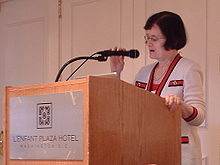Barbara Simons
| Barbara B. Simons | |
|---|---|
 |
|
| Born |
January 26, 1941 Boston, Massachusetts |
| Fields | Computer science |
| Institutions | |
| Alma mater | University of California, Berkeley |
| Doctoral advisor | Richard M. Karp |
| Spouse | James Harris Simons (ex-husband) |
Barbara Bluestein Simons (born January 26, 1941) is a computer scientist and past president of the Association for Computing Machinery (ACM). She is founder and former Chair of USACM, the ACM U.S. Public Policy Committee. Her main areas of research are compiler optimization and scheduling theory. Together with Douglas W. Jones, Simons co-authored a book on electronic voting entitled Broken Ballots.
After receiving her Ph.D. in 1981 in computer science from the University of California, Berkeley, she joined the Research Division of IBM, from which she took early retirement in 1998. In 1992, Science featured her in a special edition on women in science. In 2005 Simons became the first woman to receive the Distinguished Engineering Alumni Award from the College of Engineering of U.C. Berkeley.
She served on the President’s Export Council’s Subcommittee on Encryption and on the Information Technology-Sector of the President's Council on the Year 2000 Conversion. She is on the Board of Directors of VerifiedVoting.org. She has also been on the boards of the U.C. Berkeley Engineering Fund, the Electronic Privacy Information Center, Public Knowledge, and the Oxford Internet Institute, as well as the Advisory Council of the Public Interest Registry’s ORG. She has testified before both the U.S. and state legislatures and at government sponsored hearings. She was runner-up in the first (and only) election for the North America seat on the ICANN Board.
Simons co-founded the Reentry Program for Women and Minorities in the Computer Science Department at U.C. Berkeley. She is also on the Boards of the Coalition to Diversify Computing (CDC) and the Berkeley Foundation for Opportunities in Information Technology (BFOIT), groups that work at increasing participation in computer science of women and underrepresented minorities.
Since at least 2002 Simons has been a critic of unauditable electronic voting and is generally credited as a key player in getting the League of Women Voters to change its stance on this issue. Initially the League had seen electronic voting mainly as a way to minimize invalidly cast ballots, but at their June 2004 convention she led a successful fight to get this policy reversed to one of giving priority to voting machines that are "recountable".
...
Wikipedia
